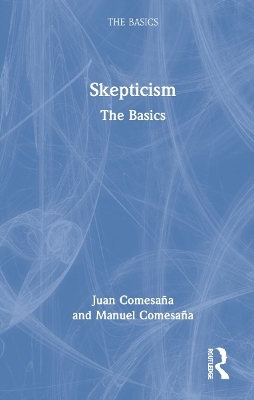
Skepticism: The Basics
Routledge (Verlag)
978-1-032-07710-9 (ISBN)
This book introduces students and other interested readers to the philosophical study of skepticism, a central and long-standing subject in philosophy. The first three chapters cover knowledge, providing the necessary foundation for introducing skepticism in the book's final three chapters. Throughout, the volume addresses basic questions in these two areas, such as:
What are the differences between the three types of knowledge: direct knowledge, knowledge by ability, and propositional knowledge?
What is the Gettier problem and why does it resist easy solutions?
Why do philosophers still talk about René Descartes’ techniques for raising doubts about what we can know but have largely forgotten Descartes’ attempts to answer these doubts?
How do we know that we’re not just brains in a vat?
Is Pyrrhonian skepticism—the idea that we know absolutely nothing—ultimately self-refuting?
With a glossary of key terms and suggestions for further reading, Skepticism: The Basics is an ideal starting point for anyone seeking a lively and accessible foray into the study of epistemology.
Key Features and Benefits:
Cover both traditional topics – like the tripartite conception of knowledge – and emerging issues, like knowledge-first epistemology and concessive responses to inductive skepticism
Demystifies an area where beginners frequently get stuck: the difference between common-sense skepticism and philosophical skepticism
Clearly explains the important contributions from historical and contemporary thinkers, like Descartes, Hume, Popper, Quine, Dretske, Strawson, Nozick, and Sosa
Juan Comesaña is Professor of Philosophy at the University of Arizona. He has published in epistemology and related areas, including Being Rational and Being Right (2020). Manuel Comesaña is Professor of Philosophy and Doctor of Philosophy and has been a professor at the University of Mar del Plata in Argentina for the last thirty years. He has published articles in philosophy journals and book chapters, as well as the book Reason, Truth and Experience: An Analysis of Their Links in Contemporary Philosophy of Science, with Special Emphasis on Popper (1996).
Introduction Part I : Knowledge 1. Kinds of Knowledge 2. The Tripartite Conception of Knowledge 3. The Gettier Problem Part II: Skepticism 4. Inductive Skepticism 5. Cartesian Skepticism 6. Pyrrhonian Skepticism Conclusion
| Erscheinungsdatum | 22.04.2022 |
|---|---|
| Reihe/Serie | The Basics |
| Zusatzinfo | 6 Line drawings, black and white; 6 Illustrations, black and white |
| Verlagsort | London |
| Sprache | englisch |
| Maße | 129 x 198 mm |
| Gewicht | 303 g |
| Themenwelt | Geisteswissenschaften ► Philosophie ► Erkenntnistheorie / Wissenschaftstheorie |
| Geisteswissenschaften ► Philosophie ► Philosophie der Neuzeit | |
| Sozialwissenschaften ► Soziologie | |
| ISBN-10 | 1-032-07710-7 / 1032077107 |
| ISBN-13 | 978-1-032-07710-9 / 9781032077109 |
| Zustand | Neuware |
| Informationen gemäß Produktsicherheitsverordnung (GPSR) | |
| Haben Sie eine Frage zum Produkt? |
aus dem Bereich

![Was heißt Denken?. Vorlesung Wintersemester 1951/52. [Was bedeutet das alles?] - Martin Heidegger](/media/113619842)
